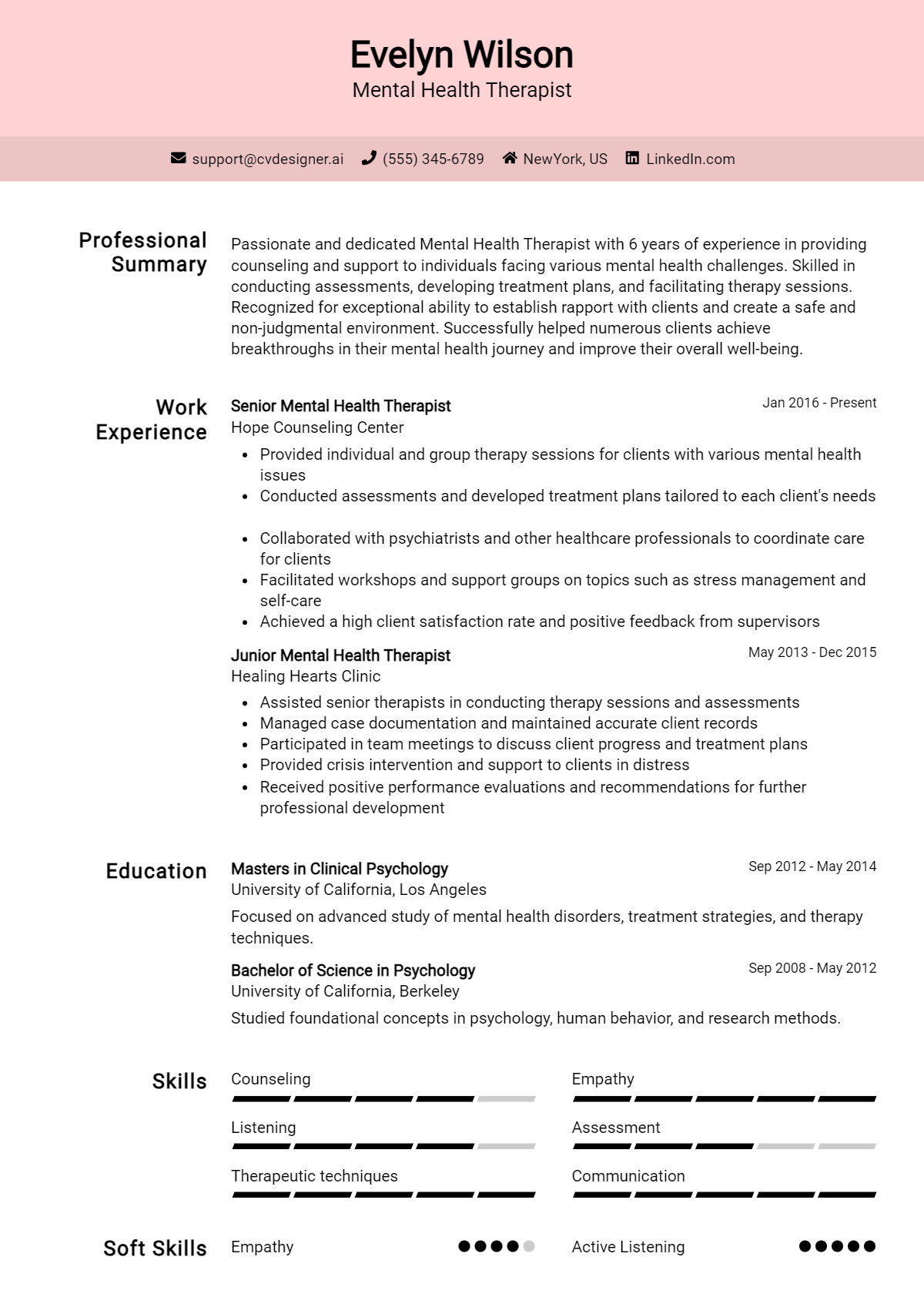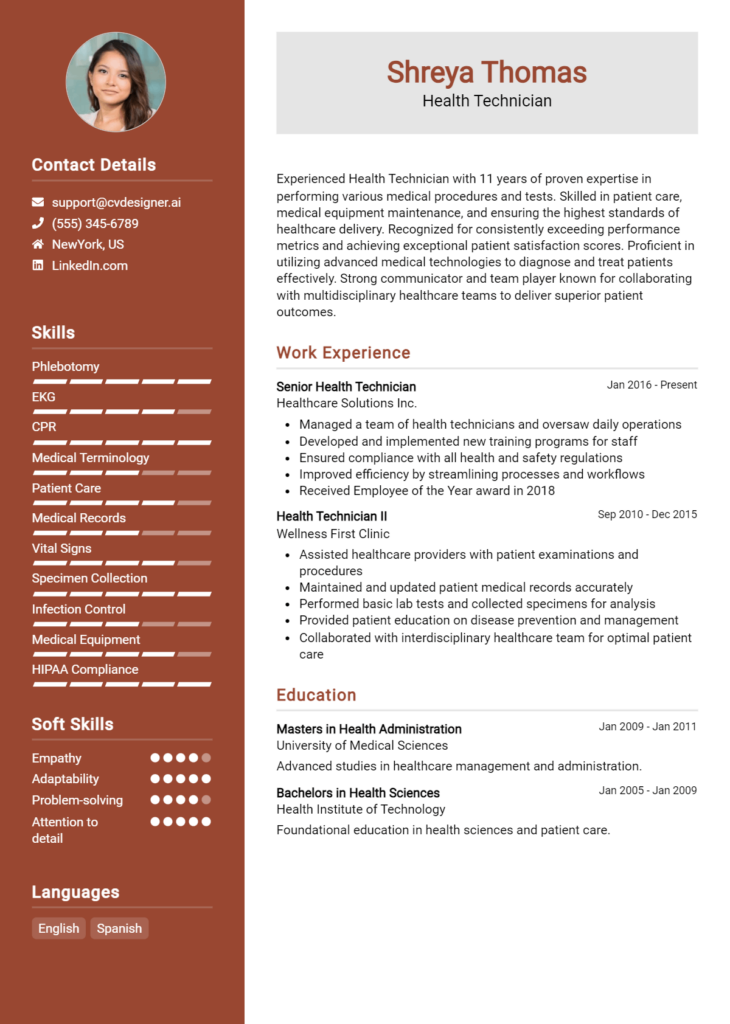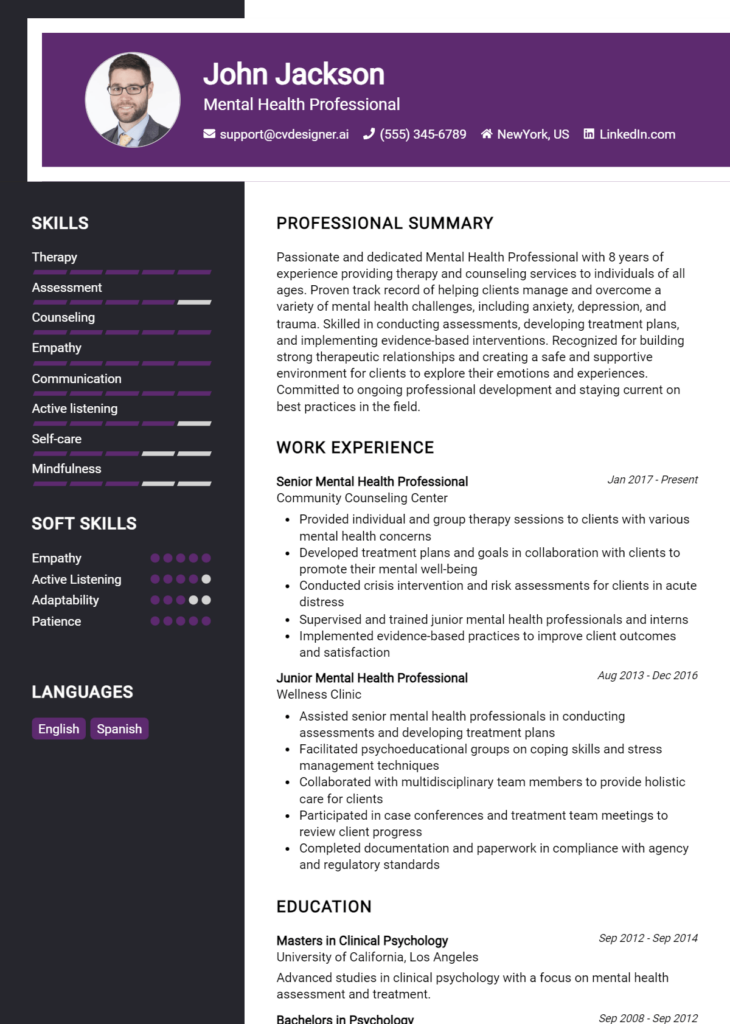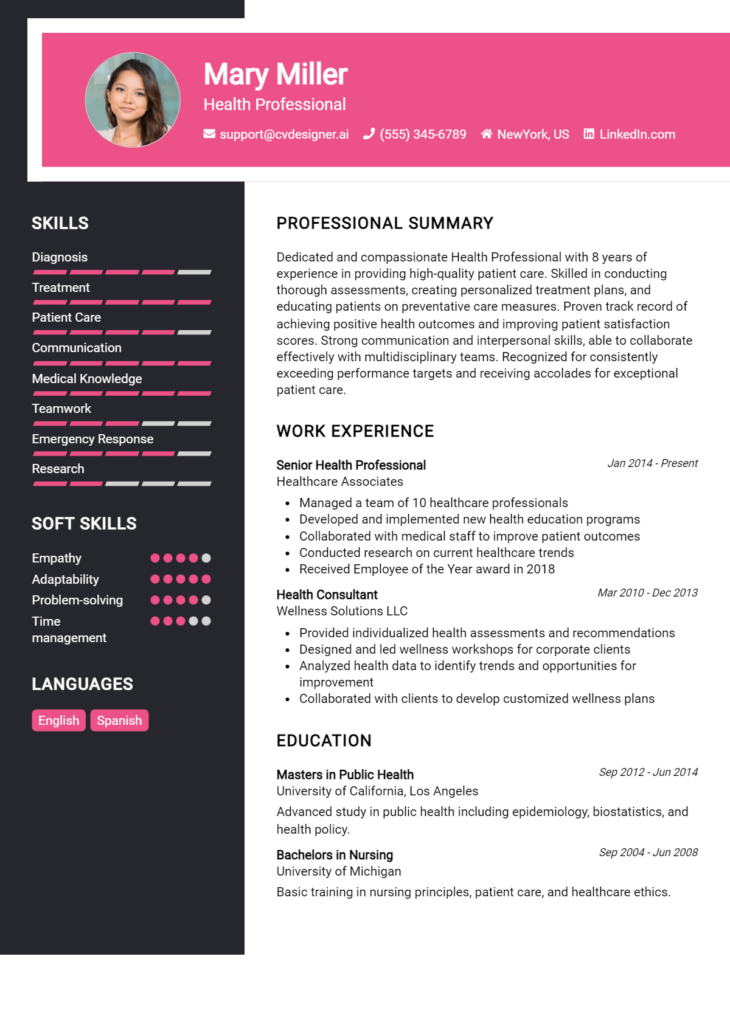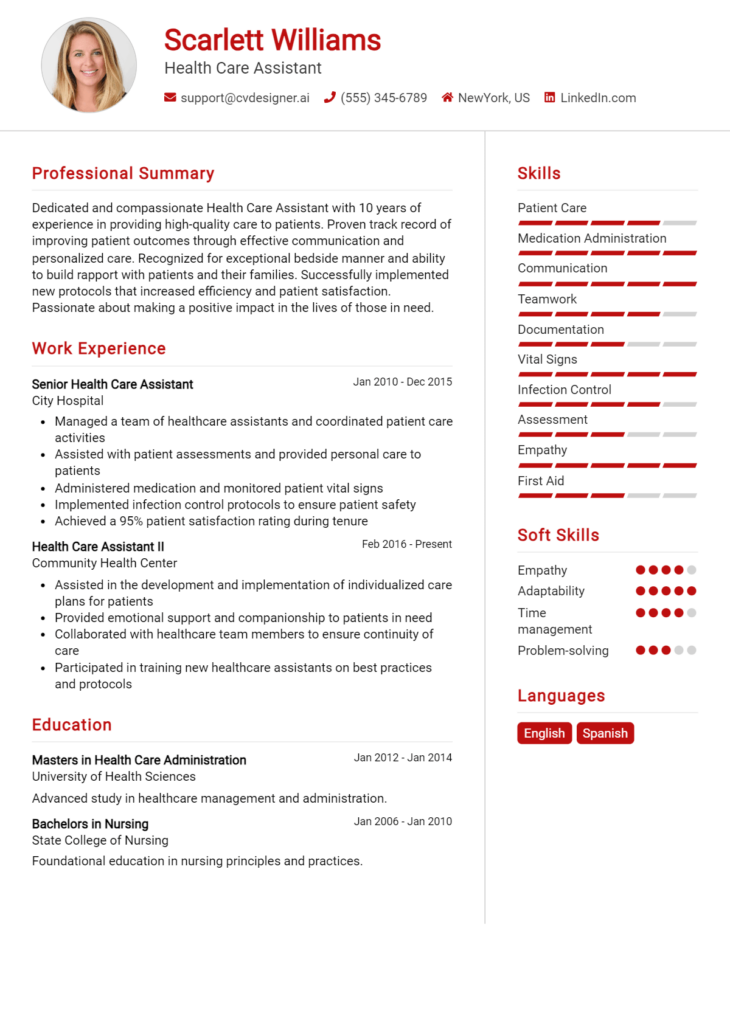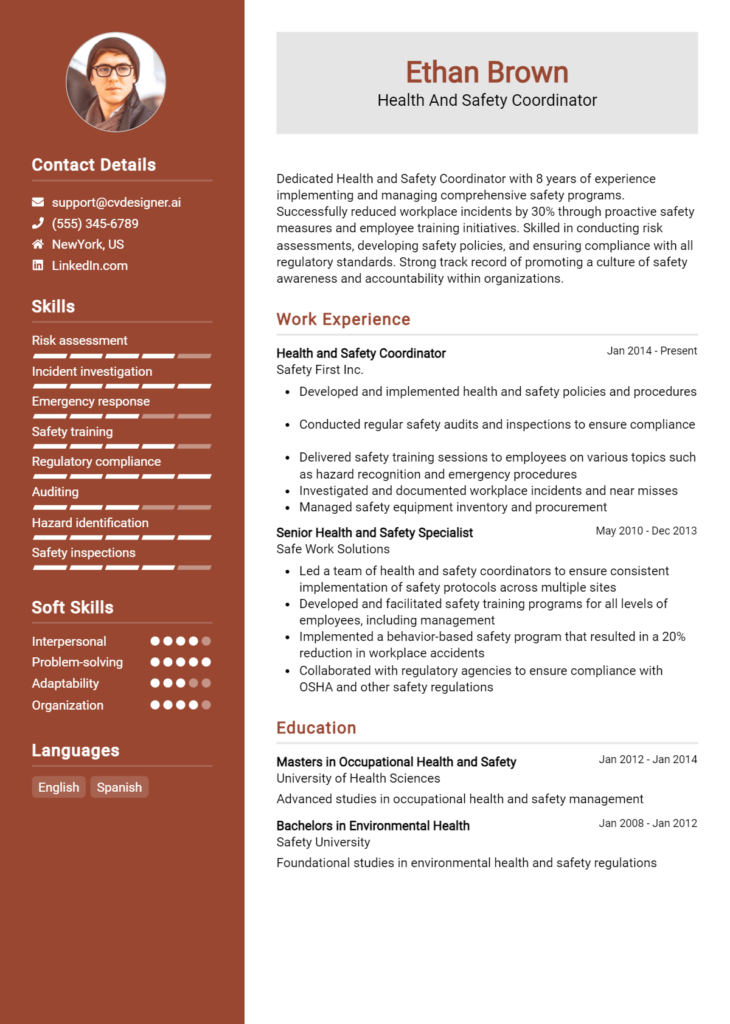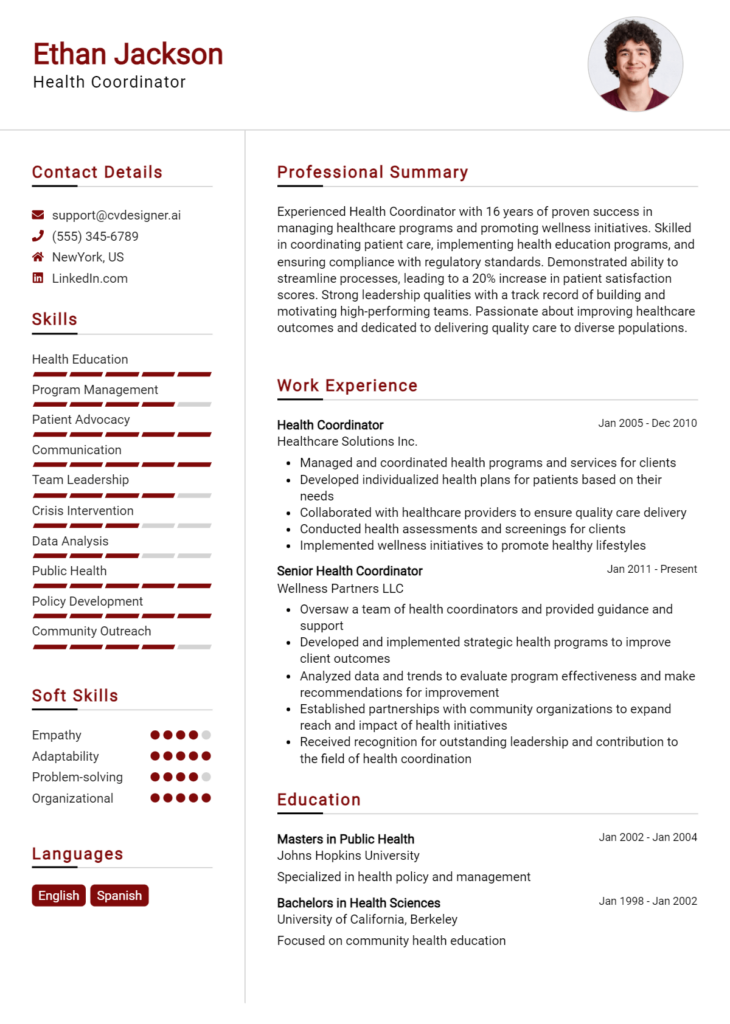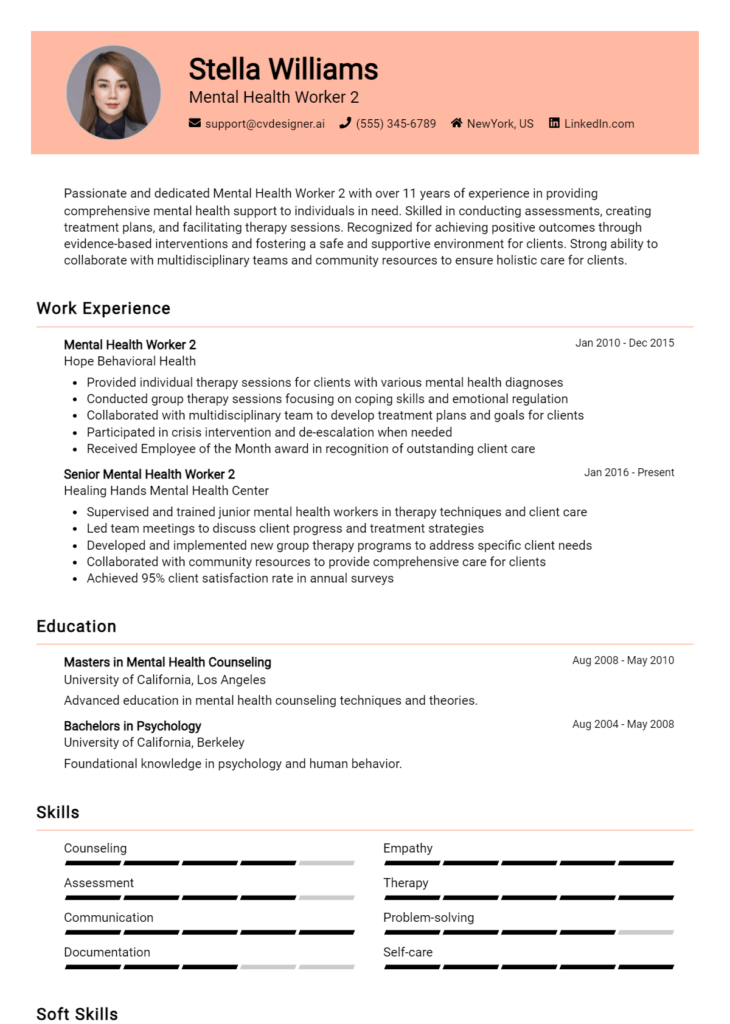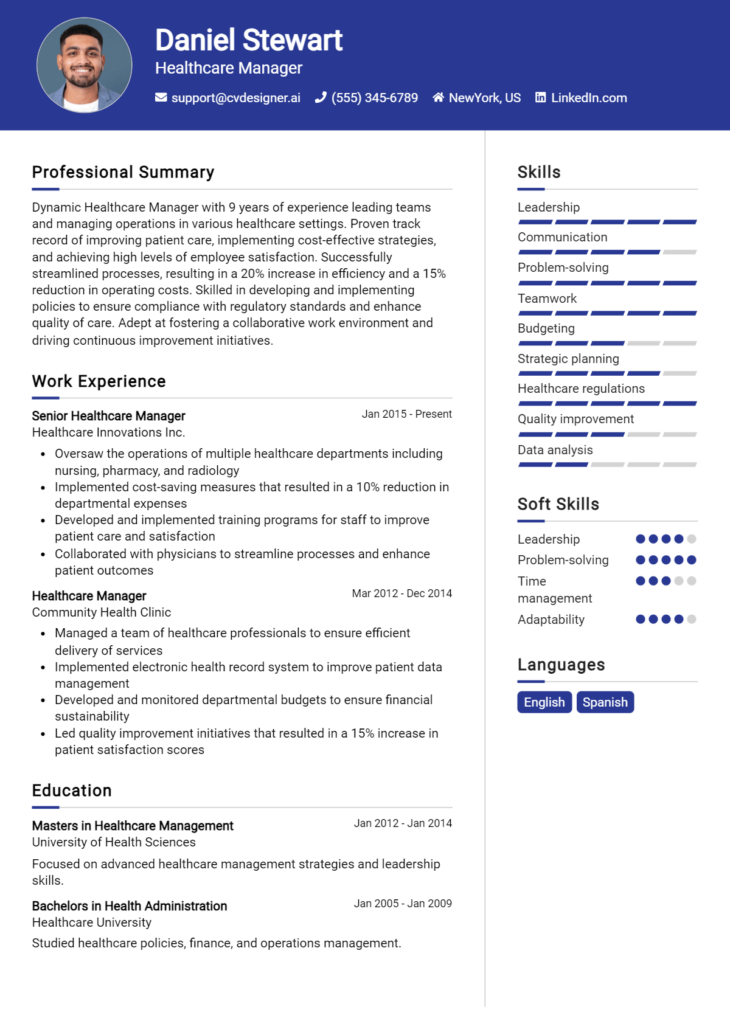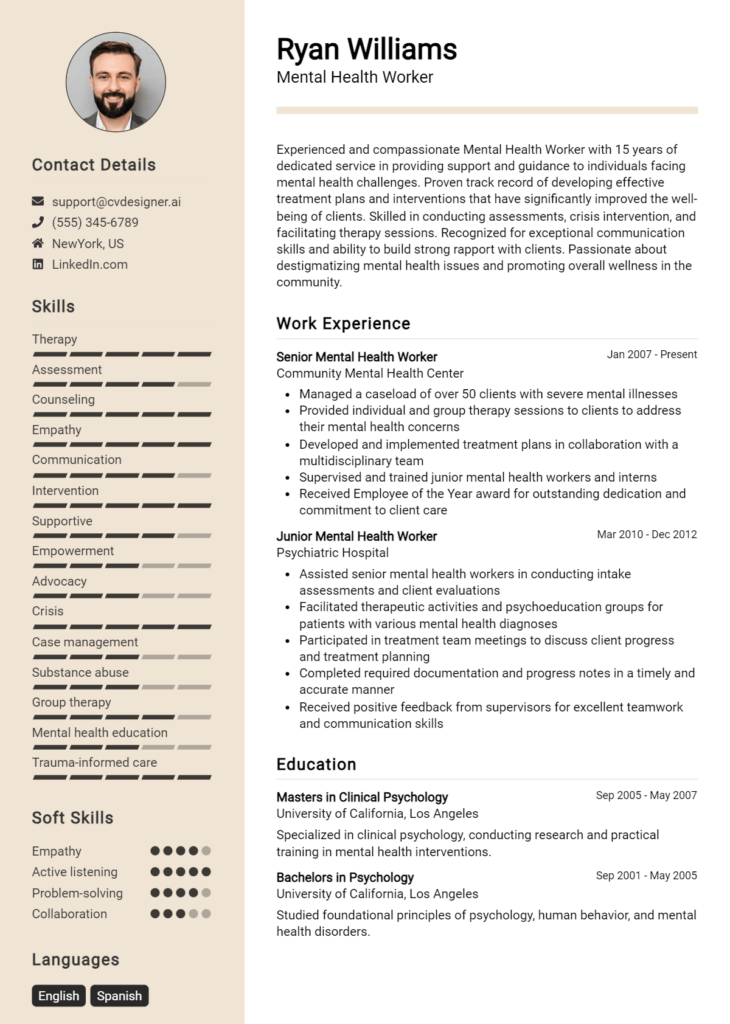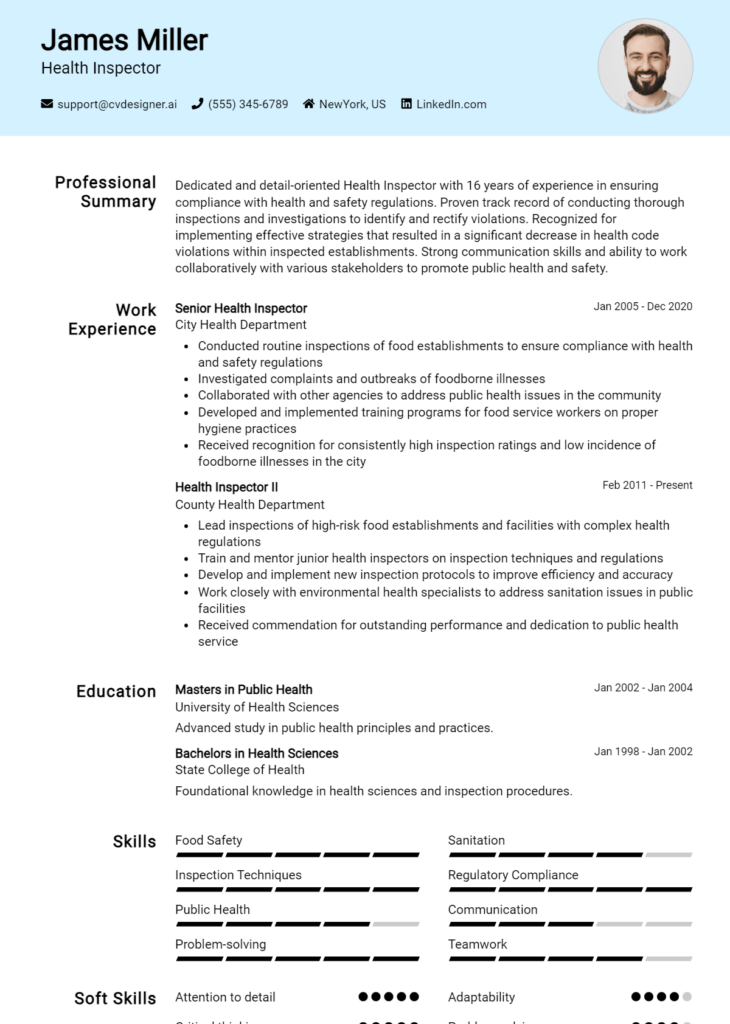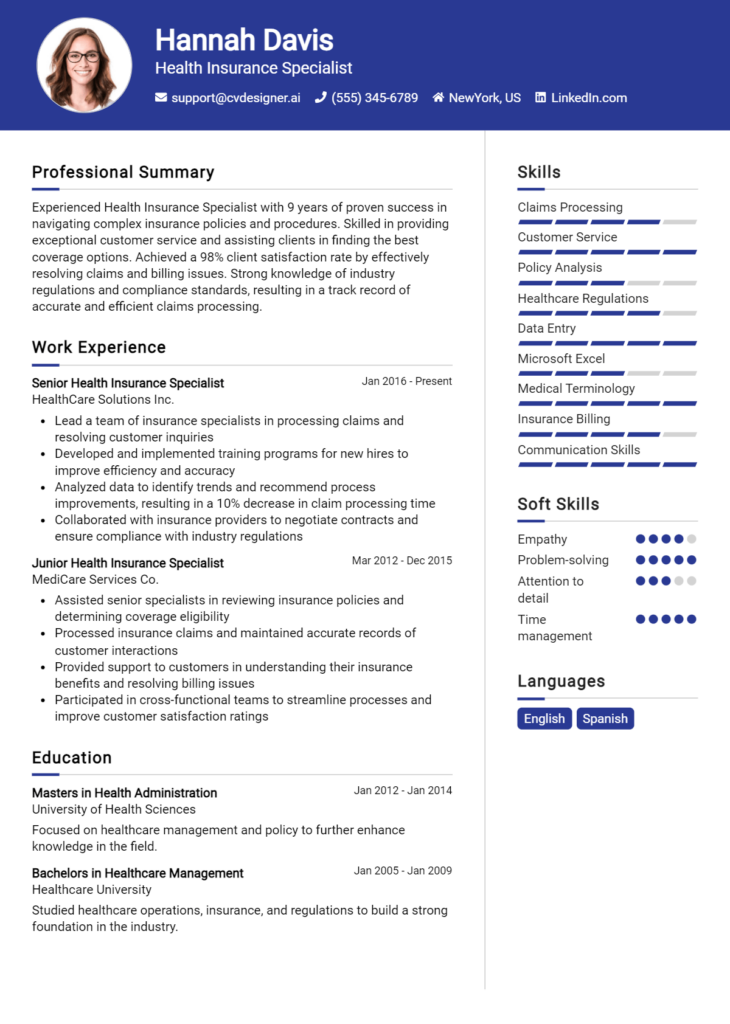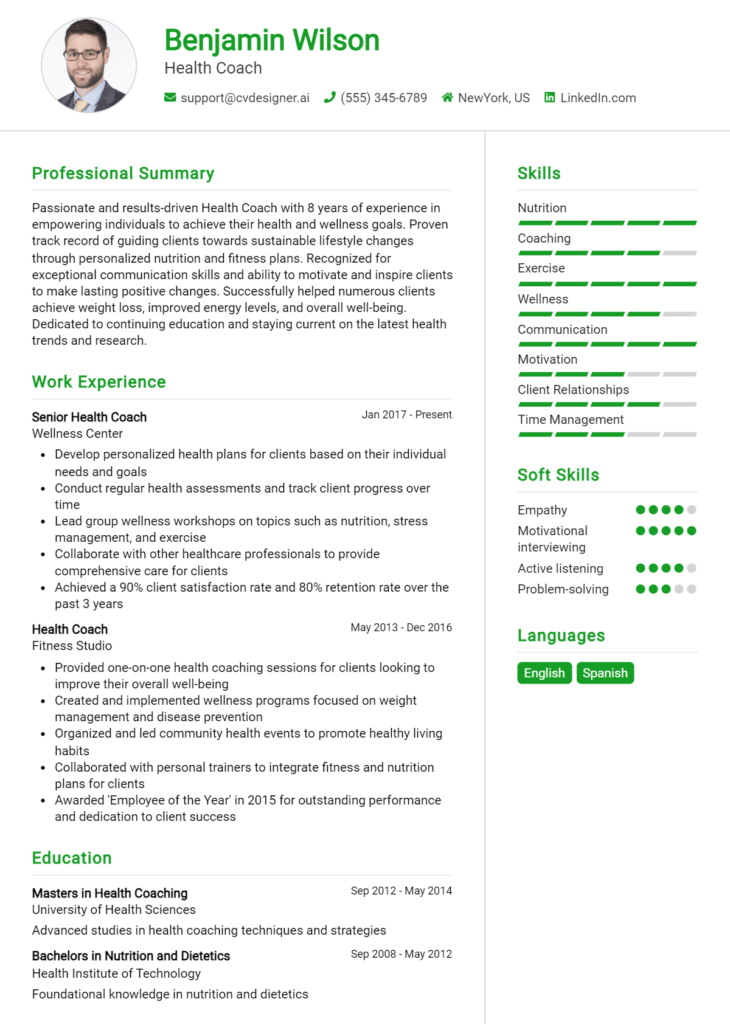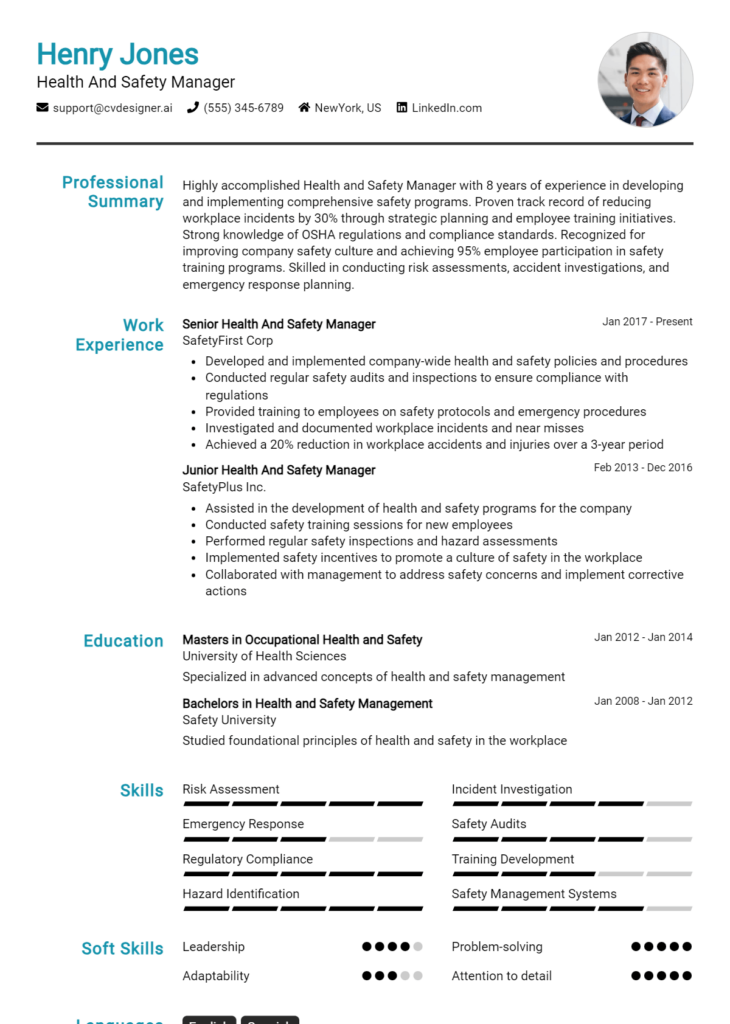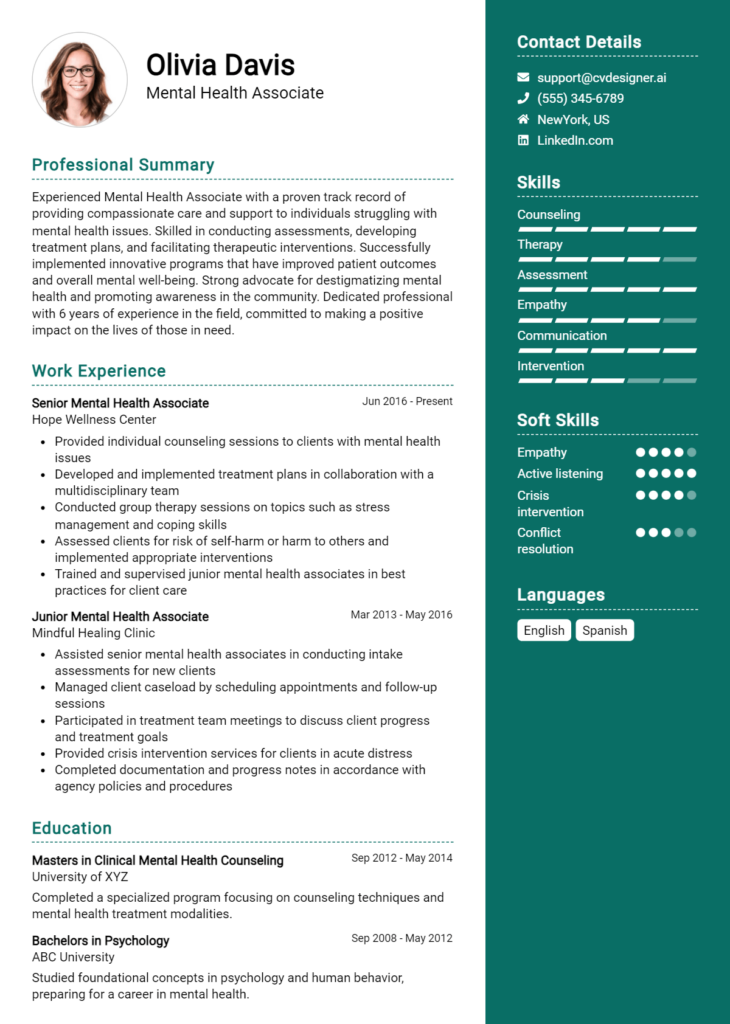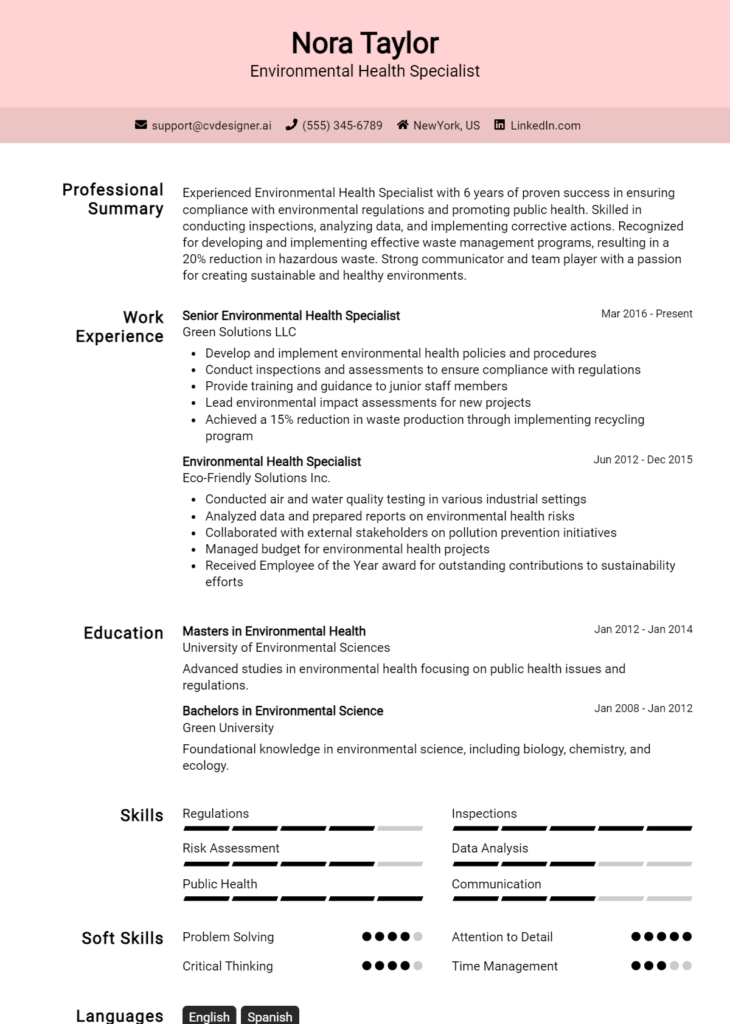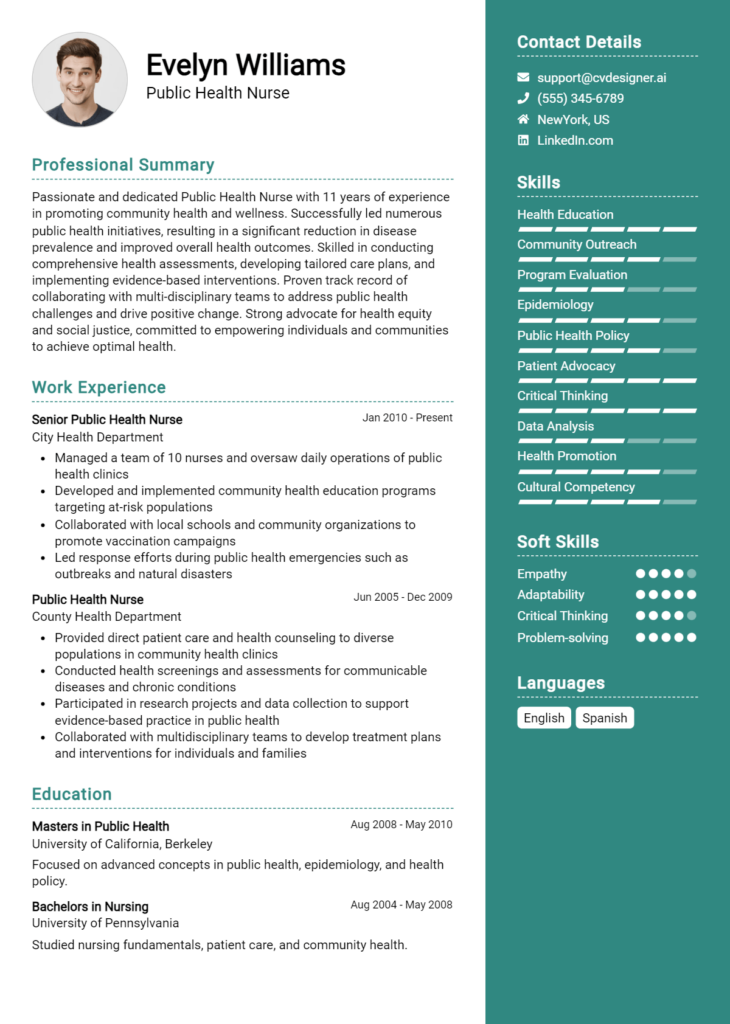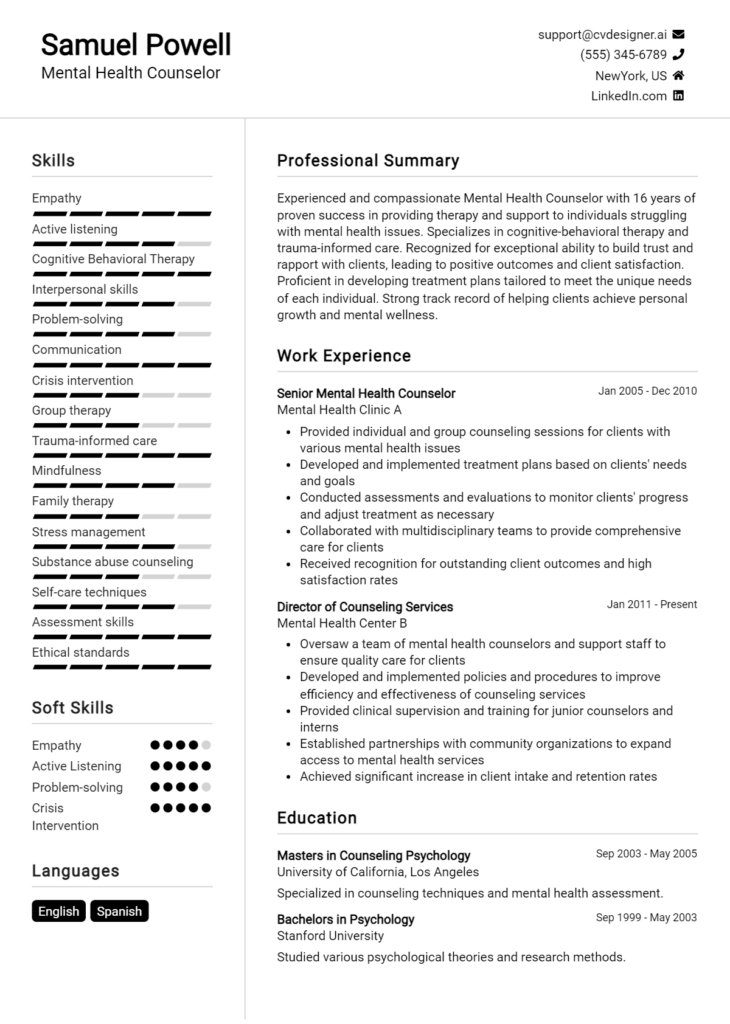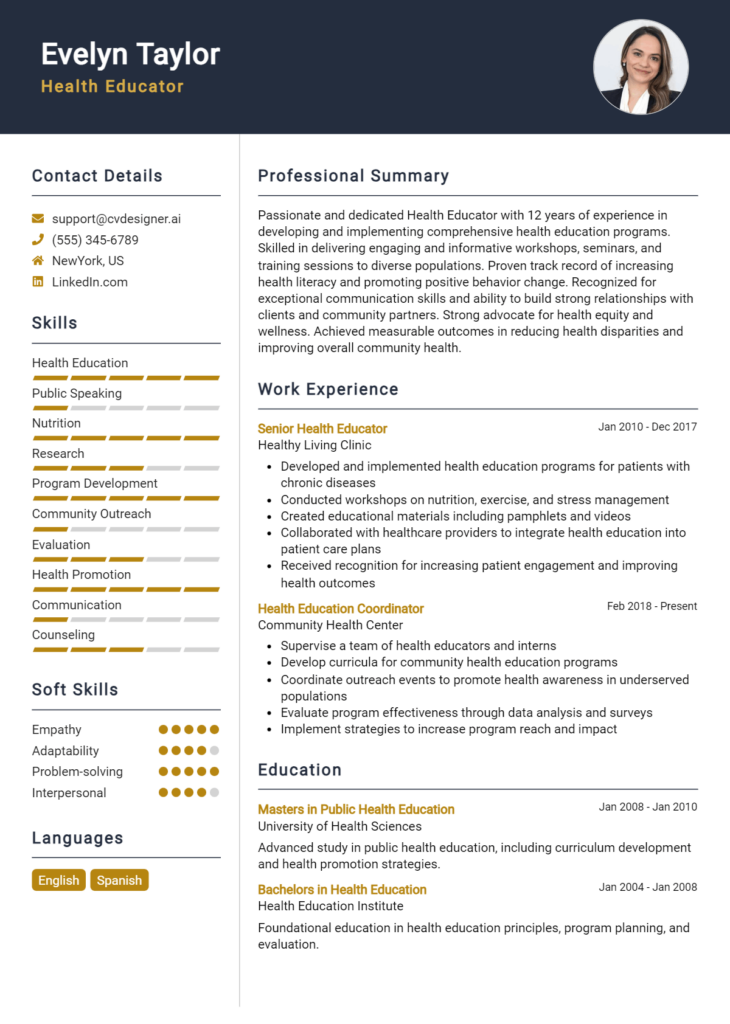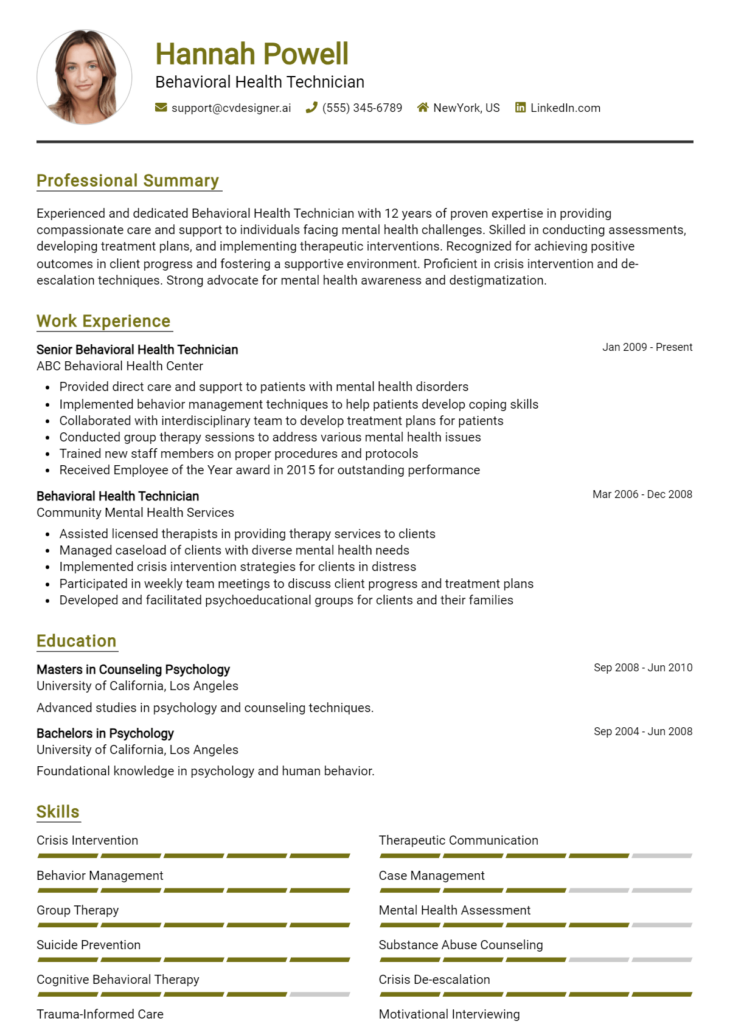Most Popular Mental Health Therapist Resume Examples
Explore additional Mental Health Therapist resume samples and guides and see what works for your level of experience or role.
As a Mental Health Therapist, your role is pivotal in guiding individuals toward healing and improving their emotional well-being. This profession requires not only expertise and compassion but also the ability to communicate your unique skills and experiences effectively through your resume. A well-crafted resume can be the difference between landing an interview and being overlooked, making it an essential tool in your job search arsenal. In this comprehensive guide, we will explore the nuances of resume writing specifically tailored for Mental Health Therapists, ensuring you present yourself in the best light possible.
Throughout this article, we will cover key aspects of resume writing, including the primary responsibilities and skills required for this role, the most effective formats to use, and common mistakes to avoid that could undermine your candidacy. You'll find resume examples suitable for all experience levels, along with practical tips on how to enhance your resume effectively. Additionally, we will provide insights into selecting the right resume templates that align with your professional identity, ensuring you stand out in a competitive job market. Prepare to transform your resume into a powerful tool that reflects your qualifications and passion for mental health therapy!
Key Responsibilities and Skills for a Mental Health Therapist
Mental Health Therapists play a crucial role in supporting individuals facing emotional, psychological, or behavioral challenges. Their primary responsibilities include conducting assessments, developing treatment plans, providing therapy sessions, and monitoring clients' progress. Additionally, they may collaborate with other healthcare professionals to ensure a holistic approach to mental health care.
Key Responsibilities:
- Conducting thorough assessments to identify clients' mental health needs
- Developing individualized treatment plans based on clients' specific goals
- Providing various therapeutic modalities, such as cognitive-behavioral therapy (CBT) or dialectical behavior therapy (DBT)
- Monitoring clients' progress and adjusting treatment plans as needed
- Maintaining accurate and confidential client records
- Offering crisis intervention and support during emergencies
- Educating clients and their families about mental health issues and treatment options
- Collaborating with other healthcare providers to coordinate care
Essential Skills:
- Empathy and active listening
- Strong communication and interpersonal skills
- Problem-solving and critical thinking abilities
- Knowledge of various therapeutic techniques and interventions
- Cultural competence and sensitivity
- Patience and resilience
- Ethical decision-making and professionalism
- Ability to work independently and as part of a team
When crafting your resume, it is essential to highlight these skills effectively in the skills section. Tailoring your responsibilities and skills to the specific job description not only makes your application stand out but also demonstrates your suitability for the role. Consider how these skills can be woven into your CV to present a comprehensive picture of your qualifications and experiences, making a strong case for your candidacy in the mental health field.
Best Resume Format and Structure for a Mental Health Therapist
When crafting a resume for a Mental Health Therapist position, selecting the right format is crucial for presenting your qualifications clearly and professionally. Here’s a detailed guide on how to structure your resume effectively.
Contact Information
- Name: Your full name should be prominently displayed at the top.
- Phone Number: Include a reliable contact number.
- Email Address: Use a professional email address.
- LinkedIn Profile: Optional, but can be beneficial if it includes relevant professional information.
- Location: City and state (full address is not necessary).
Professional Summary This section should be a brief overview (2-4 sentences) of your qualifications and what you bring to the role. Highlight your years of experience, specific therapeutic modalities, and your passion for mental health care. For example: "Compassionate and dedicated Licensed Mental Health Therapist with over 5 years of experience in providing evidence-based therapy to diverse populations. Skilled in cognitive-behavioral therapy and trauma-informed care, I am committed to fostering a safe environment for clients to explore their mental health challenges."
Work Experience List your professional experience in reverse chronological order. Include the following for each position:
- Job Title: Clearly state your role (e.g., Mental Health Therapist).
- Employer Name and Location: Provide the name and location of the organization.
- Dates of Employment: Include the month and year you started and ended each position.
- Responsibilities and Achievements: Use bullet points to describe your key responsibilities, focusing on accomplishments, methodologies used, and any improvements made in patient care. Start each bullet point with action verbs such as "provided," "developed," "conducted," etc.
Education List your educational qualifications, also in reverse chronological order. Include:
- Degree: Specify the degree obtained (e.g., Master’s in Social Work).
- Institution Name and Location: Include the name of the school and its location.
- Graduation Date: Mention the month and year of graduation.
- You may also include relevant coursework or honors if applicable.
Skills Highlight both hard and soft skills relevant to the role of a Mental Health Therapist. Examples include:
- Therapeutic Skills: Cognitive Behavioral Therapy (CBT), Dialectical Behavior Therapy (DBT), Family Therapy.
- Interpersonal Skills: Empathy, active listening, communication.
- Technical Skills: Electronic Health Records (EHR) systems, Microsoft Office Suite, teletherapy platforms.
Certifications List any relevant certifications you hold, including:
- License: e.g., Licensed Professional Counselor (LPC), Licensed Clinical Social Worker (LCSW).
- Certifications: e.g., Certified Clinical Trauma Professional (CCTP), Mental Health First Aid Certification.
Additional Tips
- Formatting: Choose a clean, professional resume format that uses consistent fonts and headings. The reverse chronological format is often the most straightforward choice for showcasing relevant experience.
- Length: Aim for 1-2 pages in length, ensuring that each section is concise and relevant to the position you're applying for.
- Tailoring: Customize your resume for each job application by including keywords from the job description that align with your experience.
When paired with a well-structured cover letter, your resume can create a cohesive application package. The cover letter should complement your resume by elaborating on specific experiences and motivations for applying. Use a similar formatting style, maintaining professionalism and clarity, to ensure that both documents present a unified personal brand.
Writing Tips and Best Practices for a Mental Health Therapist Resume
When crafting a resume as a Mental Health Therapist, it's crucial to present your qualifications and experiences in a clear and compelling manner. Begin by tailoring your resume to reflect the specific job description, ensuring that your skills and experiences align with the employer's needs. Utilize action verbs to start each bullet point, showcasing your accomplishments and responsibilities. Quantifying your achievements can provide concrete evidence of your effectiveness, while incorporating industry-specific keywords ensures that your resume resonates with hiring managers and applicant tracking systems. For a polished and professional appearance, consider utilizing resume writing tips. Also, remember that these practices can enhance your cover letter and create a cohesive narrative about your professional journey.
- Use action verbs such as "facilitated," "assessed," and "developed" to convey your skills effectively.
- Quantify your achievements where possible, such as "improved patient outcomes by 30% through tailored therapy programs."
- Incorporate relevant keywords from the job description to enhance your visibility in applicant tracking systems.
- Highlight specific therapies or approaches you are trained in, such as CBT or DBT, to demonstrate your expertise.
- Keep your formatting consistent and professional, using clear headings and bullet points for readability.
- Include relevant certifications and licenses, ensuring they are up-to-date and clearly stated.
- Tailor your resume for each application, emphasizing experiences that relate directly to the specific role.
- Proofread your resume multiple times to eliminate any grammatical errors or typos, maintaining a professional standard.
Common Mistakes to Avoid in a Mental Health Therapist Resume
When crafting a resume as a Mental Health Therapist, it's crucial to present your qualifications and experience in a clear and impactful manner. However, many candidates fall into common pitfalls that can detract from their overall presentation. Avoiding these mistakes can significantly enhance your chances of making a positive impression on potential employers. Here are some common mistakes to steer clear of when creating your resume:
- Overloading your resume with excessive information that can overwhelm readers.
- Using generic descriptions that fail to highlight unique skills and experiences.
- Neglecting to tailor your resume to the specific job you’re applying for.
- Failing to include relevant certifications and licenses that are critical in the mental health field.
- Using an unprofessional email address or inappropriate formatting.
- Listing responsibilities without showcasing achievements or outcomes.
- Ignoring the use of keywords relevant to the mental health profession, which can be crucial for applicant tracking systems.
- Making grammatical errors or typos that can undermine your professionalism.
- Not including volunteer work or continuing education that demonstrates commitment to the field.
- Overlooking the importance of a concise, well-structured layout that facilitates easy reading.
To ensure your resume stands out for all the right reasons, consider reviewing common mistakes to avoid in a resume. Additionally, it’s equally important to pay attention to your cover letter; avoid common cover letter mistakes that could diminish your application’s impact.
Sample Mental Health Therapist Resumes
As the demand for mental health services continues to grow, crafting a polished resume is essential for securing a position as a Mental Health Therapist. This guide provides three distinct sample resumes tailored to different career stages: an experienced professional, an entry-level candidate, and a career changer. Each example highlights relevant skills, qualifications, and experiences that are crucial in the mental health field. For more inspiration, feel free to explore various resume templates. Additionally, corresponding cover letter examples can help you create a complete job application package.
Sample Resume 1: Experienced Professional
Jane Doe, LCSW
123 Therapy Lane
City, State, Zip
(123) 456-7890
jane.doe@email.com
Professional Summary
Compassionate and results-oriented Licensed Clinical Social Worker with over 10 years of experience providing therapy to diverse populations. Skilled in creating individualized treatment plans, performing assessments, and conducting group therapy sessions. Committed to fostering a supportive environment for clients to promote healing and personal growth.
Education
Master of Social Work (MSW)
University of State, City, State
Graduated: May 2012
Bachelor of Arts in Psychology
University of City, City, State
Graduated: May 2010
Licenses
Licensed Clinical Social Worker (LCSW), State Board
Professional Experience
Senior Mental Health Therapist
ABC Mental Health Center, City, State
June 2015 – Present
- Provide individual and group therapy to clients dealing with anxiety, depression, and trauma.
- Develop and implement comprehensive treatment plans based on client assessments.
- Collaborate with healthcare professionals to coordinate client care and ensure holistic treatment.
- Facilitate workshops and support groups to educate clients and their families on mental health topics.
Mental Health Therapist
XYZ Counseling Services, City, State
August 2012 – May 2015
- Conducted initial assessments and developed treatment strategies for a caseload of 25 clients.
- Utilized evidence-based therapeutic techniques to improve client outcomes.
- Maintained accurate and confidential client records in compliance with HIPAA regulations.
Skills
- Cognitive Behavioral Therapy (CBT)
- Crisis Intervention
- Group Therapy Facilitation
- Patient Assessment
- Case Management
Sample Resume 2: Entry-Level Candidate
John Smith
456 Wellness Ave
City, State, Zip
(321) 654-0987
john.smith@email.com
Objective
Recent graduate with a Master’s in Clinical Psychology seeking to leverage academic training in a Mental Health Therapist position. Eager to apply therapeutic techniques and support individuals in their mental health journeys.
Education
Master of Arts in Clinical Psychology
University of City, City, State
Graduated: May 2023
Bachelor of Science in Psychology
University of State, City, State
Graduated: May 2021
Relevant Experience
Intern, Mental Health Counseling
Community Health Services, City, State
January 2023 – May 2023
- Assisted licensed therapists in conducting intake assessments and developing treatment plans.
- Supported group therapy sessions by facilitating discussions and providing feedback.
- Conducted follow-up interviews to monitor client progress and report findings.
Volunteer, Peer Support Program
University of City, City, State
September 2021 – May 2023
- Provided empathetic listening and support to fellow students experiencing mental health challenges.
- Organized events to promote mental health awareness on campus.
Skills
- Active Listening
- Empathy and Compassion
- Group Facilitation
- Time Management
- Basic Knowledge of CBT and DBT
Sample Resume 3: Career Changer
Emily Johnson
789 Change Blvd
City, State, Zip
(987) 654-3210
emily.johnson@email.com
Professional Summary
Dedicated professional with a background in education and a passion for mental health. Completed a Master’s in Counseling Psychology and seeking to transition into a Mental Health Therapist role. Experienced in creating supportive environments and fostering personal development.
Education
Master of Arts in Counseling Psychology
University of State, City, State
Graduated: August 2023
Bachelor of Arts in Education
University of City, City, State
Graduated: May 2015
Relevant Experience
School Counselor
ABC High School, City, State
August 2018 – June 2023
- Provided academic and emotional support to students, focusing on mental health and well-being.
- Developed individualized education plans (IEPs) and collaborated with teachers and parents.
- Facilitated workshops on stress management and coping strategies for students.
Teaching Assistant
XYZ Elementary School, City, State
September 2015 – June 2018
- Supported teachers in implementing lesson plans that encouraged social and emotional learning.
- Assisted in managing classroom behavior and fostering a positive learning environment.
Skills
- Counseling Techniques
- Conflict Resolution
- Youth Engagement
- Communication Skills
- Team Collaboration
Explore various resume templates for more ideas and inspiration. Don't forget to check out corresponding cover letter examples to enhance your job application package.
Checklist for a Mental Health Therapist Resume
- Proofread for Errors: Carefully read through your resume to check for spelling, grammar, and punctuation mistakes. Consider reading it out loud to catch any awkward phrasing or errors you might miss when reading silently.
- Check for Consistency: Ensure that your formatting, font sizes, and styles are consistent throughout the document. This includes headings, bullet points, and spacing.
- Tailor Your Resume: Customize your resume for each job application by highlighting the skills and experiences that align specifically with the job description of the Mental Health Therapist role you’re applying for.
- Use Action Verbs: Start each bullet point in your experience section with strong action verbs (e.g., "Counseled," "Facilitated," "Developed") to convey your achievements and responsibilities effectively.
- Highlight Relevant Certifications: Make sure to include any relevant licenses or certifications (such as LCSW, LPC, or LMFT) prominently, as these are crucial in the mental health field.
- Include Quantifiable Achievements: Wherever possible, include statistics or specific examples of your achievements (e.g., "Increased client retention by 30% through tailored treatment plans") to demonstrate your impact.
- Professional Summary: Write a compelling professional summary that encapsulates your qualifications, experience, and what makes you a standout candidate for the Mental Health Therapist position.
- Contact Information: Double-check that your contact information is accurate and up-to-date. Include your name, phone number, email address, and LinkedIn profile if applicable.
- Use an AI Resume Builder: Consider using an AI resume builder to ensure all elements are well-organized and visually appealing. This can help streamline the creation process and enhance the presentation of your resume.
- Apply Similar Principles for Other Documents: Remember that a similar checklist can also be followed when creating a CV or a cover letter. Tailoring and proofreading are essential for all job application materials.
Key Takeaways for a Mental Health Therapist Resume Guide
In conclusion, crafting a strong resume as a Mental Health Therapist is crucial in showcasing your skills and experiences effectively. By utilizing the examples and tips provided in this guide, you can create a resume that highlights your qualifications and sets you apart from other candidates. As a next step, consider downloading a professionally designed template from resume templates or enhancing your application with a compelling cover letter using our cover letter templates. For those who prefer a more hands-on approach, our best resume maker can help you create a tailored document that reflects your unique professional journey. Remember, following similar guidelines will also assist you in developing a persuasive CV and an impactful cover letter. Take the next step in your career with confidence!
